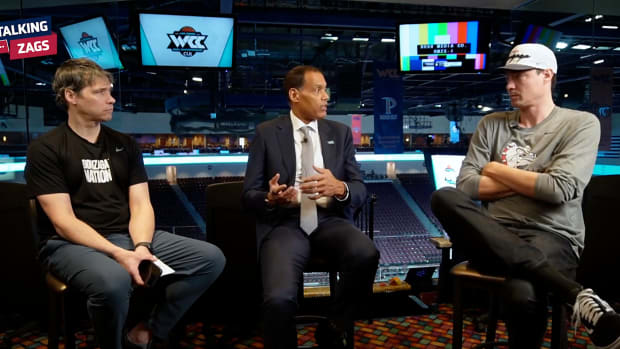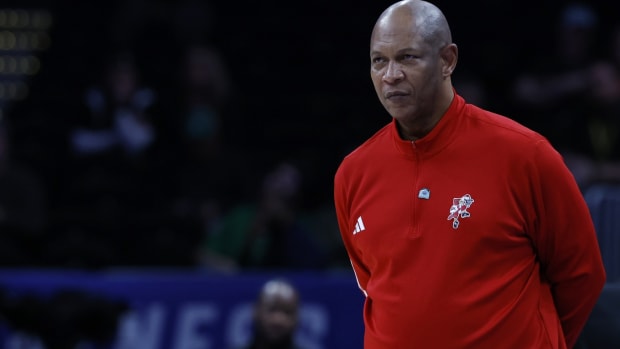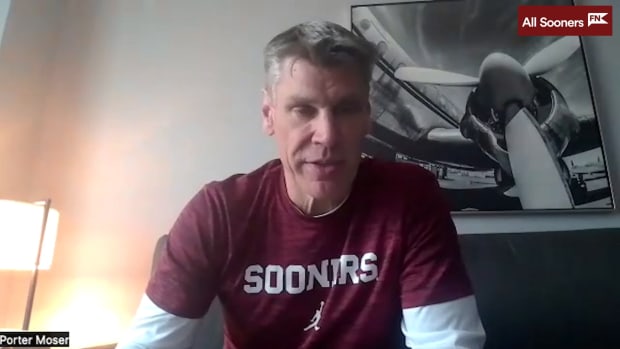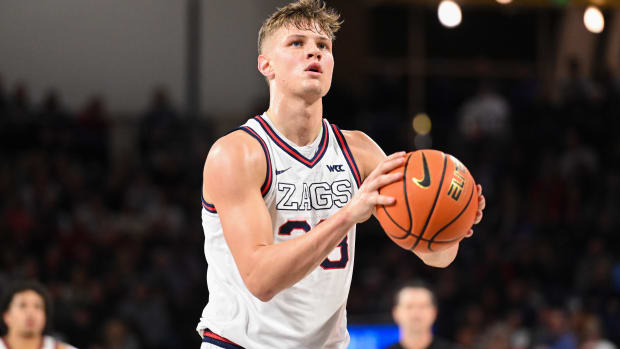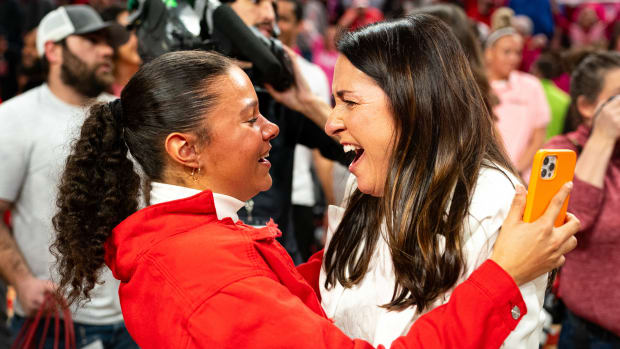The opening tip of every NCAA tournament signals the opening of possibility. College basketball’s mightiest goliaths can fall in a 40-minute battle against the most anonymous of underdogs, who capture the nation’s attention for a few hours—or a few weeks in the right year. This March could bring the next UMBC, the next Florida Gulf Coast or the next Lehigh.
CJ McCollum doesn’t agree with that final designation. “Don’t be celebrating like you’re surprised we won,” McCollum remembers telling his teammates 10 years ago, on a Friday night in Greensboro, N.C., when Lehigh defeated No. 2 Duke in the round of 64.
At the time, the victory marked just the sixth win for a No. 15 seed over a No. 2, and, along with Norfolk State’s win over Missouri that same day, was the first in more than a decade. But to McCollum and his teammates, it was no surprise. Anyone who deemed the win a herculean effort (or worse, a fluke) simply wasn’t paying attention.
“We weren’t just happy to be there,” McCollum says. “We came to the tournament to make some noise.”
Former Lehigh forward Gabe Knutson chuckles at his first meeting with McCollum in late summer 2009. The player who now stands as one of the NBA’s steadiest veteran scorers—having averaged at least 20 points per game in each of the last seven seasons—was then a skinny kid from Canton, Ohio, one who Knutson describes charitably as “maybe 150 pounds.”
The two chatted in the parking lot of Taylor House, a student dorm, flanked by their parents. They exchanged pleasantries and carried their suitcases, mini fridge and television up to their shared room, completing a rite of passage for thousands of college freshmen across the country every year. But once the teammates were settled, McCollum’s plans were anything but typical.
“We were in the gym from Day 1,” Knutson says. “We moved in and he was like, ‘Let’s go.’ Every day from the start we were playing 2-on-2, getting shots up, just working for hours.
“We could have moved in and relaxed or whatever, but it was like, ‘No. Let’s go work out, let’s go shoot, let’s go to work.’ That kind of attitude really created a winning culture at Lehigh.”
Knutson wasn’t exactly an imposing figure, either. A self-proclaimed “undersized center,” he packed on just more than 200 pounds on his 6'9" frame, earning his way to a Division I scholarship through a combination of offensive craft and skill. He received 10 offers, none from major conferences, and chose Lehigh in large part due to its reputation as a well-regarded accounting school. His recruitment process was a far cry from that of the five-star prospects he’d defeat in Greensboro three years later.
“I had interest in the [Ivy League schools], but I wasn’t getting any money from the Ivies,” Knutson says. “So I explored my options and made the decision to go to Bethlehem, Pa.”
McCollum arrived at Lehigh with a touch more fanfare. He starred as a prep player in Canton despite his small frame, starring for both GlenOak High School and the King James Shooting Stars, an AAU team formerly sponsored by the famed son of Akron. McCollum scored 54 points in the first game of his junior season, a record for both the school and Stark County. He received a letter from Brett Reed two days later.
Lehigh’s coach since 2007 was quickly enamored with McCollum. Reed made numerous appearances at GlenOak games in the recruit’s junior and senior seasons, with each visit further entrenching the coach’s belief in the diminutive guard. Lehigh wasn’t necessarily lacking in scoring punch in the season before McCollum arrived; junior point guard Marquis Hall earned first-team All–Patriot League honors as he averaged 13.9 points per game, just a shade under the team’s leading scorer, junior wing Zahir Carrington. But adding a player of McCollum’s skill was too enticing to pass up.
“CJ was underdeveloped [physically] when we watched him in high school, but he was like Steph Curry in his body type, his scoring, his skill set,” Reed says. “I remember the first time I saw him I was like, ‘Wow, he scores it so smooth, everything comes so easy.’ The game looked effortless to him.”
The freshman duo made an immediate impact. An impressive training camp from Knutson led to his earning a starting role on opening night, while McCollum made his debut in the starting lineup two games later. Lehigh’s 22 wins in 2008–09 marked the most in program history. McCollum dropped 25-plus points nine times en route to Patriot League Player of the Year. Stabler Arena in Bethlehem served as the site for three conference tournament blowouts, sending Lehigh to the Big Dance for just the second time since 1989.

Reed, seen here celebrating the 2012 Duke win, recruited McCollum to Bethlehem.
Streeter Lecka/Getty Images
The upset of a lifetime would have to wait. Kansas dismissed Lehigh, 90–74, in the first round of the 2010 tournament, a game Reed views as a seminal moment of the McCollum era. McCollum wishes tape of the game didn’t exist.
Lehigh’s star finished the night with 26 points, but the final total obscures his performance. McCollum shot 7-of-21 from the field and 2-of-8 from three. He tallied five turnovers for just the second time that season. Reed recalls having to bring the freshman to the bench early in the game, a move that allowed him to “refocus and regather.” Kansas’s lead was cut to six with just 13 minutes remaining, though the classic tournament narrative followed. The No. 1 seed attacked the paint and forced turnovers. The Jayhawks’ sheer size overwhelmed Reed's carefully crafted game plan. The Mountain Hawks’ time in the tournament was over in short order, making them yet another footnote in decades of overmatched blowouts.
It took 24 months for Lehigh to return to March’s biggest stage. The interim period between Big Dances provided a well of opportunity for growth, with an enhanced schedule including matchups against St. John’s, Iowa State and Michigan State, a No. 1 seed in 2012.
Lehigh narrowly lost at Bucknell in the conference tournament in 2011, falling by two in front of a raucous crowd. (McCollum still contends officials missed a blatant foul call on Bucknell forward Mike Muscala, recalling the incident with a noted dismay more than a decade later.) The Mountain Hawks hassled Draymond Green and forced a technical from an irate Tom Izzo in a 90–81 loss nine months later, a game in which Michigan native and Lehigh senior Holden Greiner poured in 24 points. A revenge win over Bucknell in the ’12 conference final sent Lehigh back to the NCAA tournament, and the wide-eyed group that lost to the Jayhawks in ’10 returned to March Madness with a steely focus, this time brimming with self-belief.
“The police escort, the hotel, practicing in a new arena, that stuff was all so new when we played Kansas,” Knutson says. “Facing Duke was all business. We were ready not just to show up but to go out there and win.”
Reed didn’t need to inspire confidence in the hours before tip-off in Greensboro. His team erupted with applause days before learning its matchup on Selection Sunday. Knutson expressed relief about avoiding Syracuse’s zone defense and Baylor’s potent front line with Quincy Acy and Perry Jones. A Duke team that produced eight NBA players—including Seth Curry and Austin Rivers—wasn’t a juggernaut to be feared. Not with McCollum on the other side.
“They were following my lead,” McCollum says. “Our guys had confidence, and they knew we had played against a lot of talented players in the Big Ten, other big conferences. They knew they could hang with anyone.
“I just told our team, keep the game close, and I’ll close it out at the end. That was the message.”
Duke landed a Tyson-esque shot in the first minute. Mason Plumlee drove into the lane after senior forward John Adams bit on a pump fake, and with a clear lane ahead, Plumlee rose to the rim for a thunderous dunk. But as the Blue Devils’ bench leaped in applause, Lehigh kept its cool. “A lot of teams would have taken that differently,” Knutson says. “But it wasn’t some eight-point play.”
Lehigh quickly shrugged off Plumlee’s slam. The first half featured seven ties and eight lead changes, and Duke entered the locker room with a meager two-point lead. Plumlee turned in a dominant 9-for-9 performance en route to 19 points across the full 40 minutes, but his teammates failed to deliver. Non-Plumlee Blue Devils shot 30.6% from the field. Curry and Rivers combined to go 3-of-14 from three. As Duke’s guards struggled, McCollum heated up after halftime.
The Mountain Hawks star generated many of his 18 second-half points the same way he earned his way into the national spotlight: sheer determination. He burrowed his way to the rim ad nauseum, earning 13 free throw attempts in the final 20 minutes. His teammates once again followed his lead. Duke’s five-point lead with 17 minutes left was erased by buckets from Knutson and McCollum. The Blue Devils went on a 7–0 run to take a 49–47 lead with under nine minutes to play, but once again, their run was answered. A three from Lehigh guard Mackey McKnight one possession later gave it a lead it would never relinquish.
“A lot of times teams like Lehigh can hang in there for a while before the big dog just comes and overpowers them,” Reed says. “That wasn’t the case with us. … Listening to our guys talking to each other, they had the right message, they had the right demeanor.”
Knutson notes a pair of reasons for Lehigh to thank the selection committee upon further reflection. Playing the game in Greensboro allowed Duke to be just 55 miles from campus. It also invited a host of fans eager to see Mike Krzyzewski’s squad fall. North Carolina was also placed in Greensboro as the No. 1 seed in the Midwest region, and after a 19-point win over Vermont, the Tar Heels faithful turned to their second (or, perhaps, first) passion: rooting against Duke.
Video of the game matches Knutson’s memory. Each Lehigh basket down the stretch elicited a roar from the suddenly partisan crowd, one that reached a fever pitch as a dunk from Adams put Lehigh up 59–54 with two minutes remaining. A pair of McCollum free throws iced a 75–70 win two minutes later, completing one of the greatest upsets in tournament history.
There was no interest in following the Cinderella script as the buzzer sounded. No players sprinted from the bench to midcourt in celebration. Reed and Krzyzewski exchanged calm pleasantries. Remove the seeding tag, and Lehigh’s win wasn’t some shocker. Both teams entered at 27–7 on the season. Duke had a notable injury in the middle as center Ryan Kelly nursed a foot issue. And most importantly, Lehigh had, as Krzyzewski noted postgame, “the best player on the court,” in McCollum. As the public mourned their busted brackets, Lehigh exited the floor as though the win was business as usual.
“You can see it in our reactions after the game,” Knutson says. “We weren’t jumping around. We wanted to win another game. Which is probably pretty rare.”
Lehigh’s win over Duke wasn’t any sort of fairy tale. Neither was what followed.
The Mountain Hawks surrendered a 17-point lead in their second-round matchup against Xavier, a loss Reed attributes in part to his team running out of gas after being on a “big emotional high.” And while McCollum returned to Bethlehem for his senior season, the program would never again reach the heights of the win in Greensboro in 2012.
It’s not hard to see why McCollum’s teammates speak of him with such reverence, and it’s more than the scoring outbursts and all-conference honors. He carries himself with a rare self-assurance, a confidence borne from the work ethic of a player outside the traditional preps-to-lottery pipeline. “I had been under the radar my whole life,” McCollum says. “I said, ‘Let people watch me; let them critique me.’” McCollum was a likely first-round selection in the 2012 NBA draft if he didn’t return to Lehigh. He eschewed millions in guaranteed money to make a name for himself on a national stage as a senior.
McCollum’s gamble initially appeared to be a prudent one. He poured in 36 points in Lehigh’s season opener against Baylor, and he averaged 25.7 points per game—with outrageous 51/53/84 shooting splits—in the 2012 portion of his senior season. But disaster struck when the calendar turned to January.
A potential All-American campaign ended at VCU on Jan. 5, 2013. McCollum limped off the floor after a drive to the basket late in the first half, and postgame X-rays revealed a fracture of the fifth metatarsal in his left foot. McCollum was initially ruled out for 8–10 weeks. He never made a return to the court as a college player. And a potential tournament force was eliminated from contention as its star scorer and leader exited the lineup.
“I feel extremely strong about that 2012–13 team,” Reed says. “Had CJ not gotten hurt, I think we’d be a tournament team, and I think we could have made some noise, to be honest with you.”
The principles from Lehigh’s 2012 tournament win don’t dwell on McCollum’s injury and their robbed chance of a March Madness repeat. McCollum is busy leading the Pelicans to the play-in tournament in the Western Conference. Reed is on the recruiting trail after completing his 15th season as Lehigh’s coach. Knutson logged a few years playing in central Europe, hanging up his sneakers for work as a financial reporter in New York. A 10-year reunion in February featured Knutson and six teammates, with the rest of the roster and staff spread across the country.
Lehigh’s story has its own unique arc, though in truth, it’s not entirely dissimilar from the underdogs of years past, nor the ones we will inevitably see in the coming days. Members of Lehigh’s 2011–12 team will be tied to one another for decades to come, with the win over Duke culminating a magical three-year journey.
“That win is something we’ll have forever,” Knutson says. “It’s a bond we’ll always share.”
More March Madness Coverage:
• Who Could Be This Year’s Cinderella?
• 1–68: Ranking the Men’s Tourney Field
• Upset Picks and Fearless March Predictions





